| Listing 1 - 8 of 8 |
Sort by
|
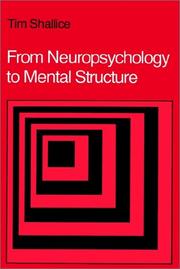
ISBN: 0521313600 0521308747 9780521313605 9780511526817 9780521308748 Year: 1988 Publisher: Cambridge: Cambridge university press,
Abstract | Keywords | Export | Availability | Bookmark
 Loading...
Loading...Choose an application
- Reference Manager
- EndNote
- RefWorks (Direct export to RefWorks)
Behavioral neurology --- Brain --- Brain damage --- Brein --- Cerebrum --- Cerveau --- Clinical neuropsychology --- Cognitie --- Cognition --- Hersenen --- Hersenletsels --- Hersenschade --- Klinische neuropsychologie --- Lésions cérébrales --- Mind --- Neurology [Behavioral ] --- Neuropsychologie --- Neuropsychologie clinique --- Neuropsychology --- Psychologie [Neuro] --- Lésions et blessures --- Brain. --- Cognition. --- Encephalon --- Brains --- Encephalons --- Cognitive Function --- Cognitions --- Cognitive Functions --- Function, Cognitive --- Functions, Cognitive --- methods. --- Neuropsychology. --- Clinical neuropsychology. --- Brain damage. --- Lésions et blessures --- Psychology --- Neurophysiology --- Psychophysiology --- Neurology, Behavioral --- Clinical psychology --- Psychology, Pathological --- methods --- Diseases --- Wounds and injuries --- Methods --- Neuropsychology - methods.
Book
ISBN: 0511870612 0511526814 Year: 1988 Publisher: Cambridge : Cambridge University Press,
Abstract | Keywords | Export | Availability | Bookmark
 Loading...
Loading...Choose an application
- Reference Manager
- EndNote
- RefWorks (Direct export to RefWorks)
As a cognitive neuropsychologist, Tim Shallice considers the general question of what can be learned about the operation of the normal cognitive system from the study of the cognitive difficulties arising from neurological damage and disease. He distinguishes two types of theories of normal function - primarily modular and primary non-modular - and argues that the problems of making valid inferences about normal function from studies of brain-damaged subjects are more severe for the latter. He first analyzes five well-researched areas in which some modularity can be assumed: short-term memory, reading, writing, visual perception, and the relation between input and output language processing. His aim is to introduce the methods about normal function mirror ones derived directly from studies of normal subjects and indeed at times preceded them. He then more theoretically examines these inferences, from group studies and individual case studies to modular and non-modular systems. Finally, he considers five areas where theories of normal function are relatively undeveloped and neuropsychology provides counterintuitive phenomena and guides to theory-building: the organization of semantic systems, visual attention, concentration and will, episodic memory, and consciousness.
Neuropsychology. --- Cognition. --- Clinical neuropsychology. --- Brain damage.
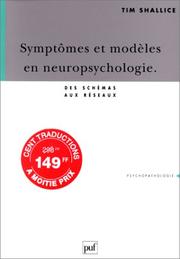
ISBN: 2130461948 Year: 1995 Volume: *2 Publisher: Paris Presses universitaires de France
Abstract | Keywords | Export | Availability | Bookmark
 Loading...
Loading...Choose an application
- Reference Manager
- EndNote
- RefWorks (Direct export to RefWorks)
Behavioral neurology --- Clinical neuropsychology --- Cognitie --- Cognition --- Klinische neuropsychologie --- Neurology [Behavioral ] --- Neuropsychologie --- Neuropsychologie clinique --- Neuropsychology --- Psychologie [Neuro] --- Cognitive neuroscience --- Neurosciences cognitives
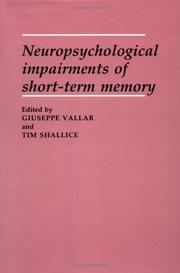
ISBN: 0521370884 Year: 1990 Publisher: Cambridge : Cambridge University Press,
Abstract | Keywords | Export | Availability | Bookmark
 Loading...
Loading...Choose an application
- Reference Manager
- EndNote
- RefWorks (Direct export to RefWorks)
Memory Disorders --- Memory, Short-Term --- Psycholinguistics --- Clinical neuropsychology --- Memory disorders --- Short-term memory --- Neuropsychologie clinique --- Troubles de la mémoire --- Mémoire immédiate --- physiopathology --- congresses --- physiology --- Congresses --- Congrès --- Troubles de la mémoire --- Mémoire immédiate --- Congrès --- Congresses. --- congresses.
Book
ISBN: 9780199579242 0199579245 Year: 2011 Publisher: Oxford: Oxford university press,
Abstract | Keywords | Export | Availability | Bookmark
 Loading...
Loading...Choose an application
- Reference Manager
- EndNote
- RefWorks (Direct export to RefWorks)
Cognitive psychology --- Physiology of nerves and sense organs --- Cognitive neuroscience --- Brain --- Thought and thinking --- Mental Processes --- Brain Mapping --- Neurosciences --- physiology --- history --- Brain - physiology --- Neurosciences - history
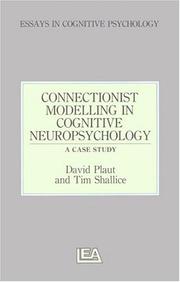
ISBN: 0863773362 Year: 1994 Publisher: Hillsdale, NJ ; Hove : Lawrence Erlbaum Associates [LEA],
Abstract | Keywords | Export | Availability | Bookmark
 Loading...
Loading...Choose an application
- Reference Manager
- EndNote
- RefWorks (Direct export to RefWorks)
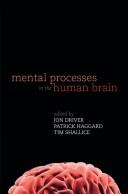
ISBN: 9780199230617 Year: 2008 Publisher: Oxford ; New York : Oxford University Press,
Abstract | Keywords | Export | Availability | Bookmark
 Loading...
Loading...Choose an application
- Reference Manager
- EndNote
- RefWorks (Direct export to RefWorks)
Brain --- Cognition --- Mental Processes --- Cognitive neuroscience. --- Neurosciences cognitives --- physiology --- physiopathology --- Cognitive neuroscience --- PBIB --- Cognitive neuropsychology --- Cognitive science --- Neuropsychology --- Cognitieve neurowetenschappen --- Neuropsychologie
Book
ISBN: 0511665547 Year: 1990 Publisher: Cambridge : Cambridge University Press,
Abstract | Keywords | Export | Availability | Bookmark
 Loading...
Loading...Choose an application
- Reference Manager
- EndNote
- RefWorks (Direct export to RefWorks)
This work summarizes the empirical and theoretical work on impairments of short-term memory (often caused by damage in the left cerebral hemisphere) and contains chapters from virtually every scientist in Europe and North America working on the problem. The chapters present evidence from both normal and brain-damaged patients. Two neuropsychological issues are discussed in detail: first, the specific patterns of immediate memory impairment resulting from brain damage with reference to both multistore and the interactive-activation theoretical frameworks. Also considered is the relation between verbal STM and sentence comprehension disorders in patients with a defective immediate auditory memory: an area of major controversy in more recent years.
Human geography --- History. --- History
| Listing 1 - 8 of 8 |
Sort by
|

 Search
Search Feedback
Feedback About UniCat
About UniCat  Help
Help News
News